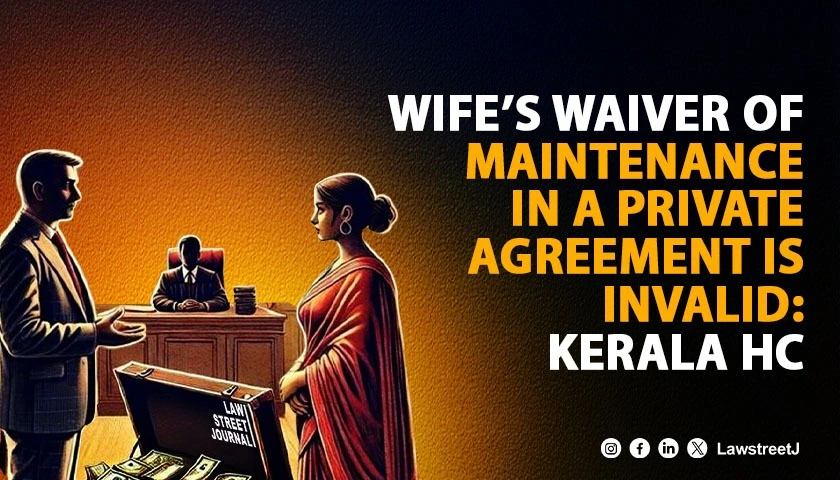Kerala: The Kerala High Court has delivered a significant judgment affirming that a private agreement between spouses, where the wife waives her right to maintenance, has no legal validity—emphasizing that such agreements are opposed to public policy.
Justice A. Badharudeen dismissed a revision petition challenging the concurrent verdicts of lower courts that had granted interim maintenance to a divorced woman under the Protection of Women from Domestic Violence Act, 2005.
The case involved a revision petition filed by the husband against his ex-wife. The court noted, “The petitioner approached the trial court under Section 20 of the Protection of Women from Domestic Violence Act, 2005, seeking various reliefs, including interim maintenance.”
Addressing the specific issue of the private agreement, the respondent contended: “In view of clause No. 4 in Annexure A2, the petitioner could not claim maintenance. Therefore, the trial court as well as the appellate court went wrong in granting interim maintenance to the petitioner, who actually did not deserve maintenance from the respondent.”
The court also took note of the contention that the Annexure A2 agreement had been created by the petitioner and was under challenge in separate litigation initiated by him.
While referring to several precedents set by the apex court—Bhupinder Singh v. Daljit Kaur, Haroon v. Sainabha, Bai Tahira v. Ali Hussain Fidaalli Chothia, and Vikraman Nair v. Aishwarya—the court reiterated the legal position regarding such agreements:
“When an agreement is entered into between the wife and the husband, as part of a compromise filed in court or otherwise, whereby the wife relinquishes or waives the right to claim maintenance in future from the husband, such an agreement is opposed to public policy and does not preclude her from claiming maintenance.”
In a specific directive, the court held, “The said concurrent findings do not require any interference,” and dismissed the petition with a direction to the respondent to clear the entire due amount within a period of 30 days from today, failing which the petitioner is at liberty to proceed with coercive steps to realise the same as per law.
The court emphasized several key principles for determining maintenance, including the financial capacity of the husband, his actual income, reasonable expenses for his own maintenance, and dependent family members whom he is legally obliged to maintain.
The judgment noted that the husband, a pilot by profession with a monthly take-home salary of ₹8,35,000, was obligated to pay interim maintenance of ₹30,000 as ordered by the trial court and confirmed by the appellate court.
The court also directed that a copy of the order be forwarded by the registry to the jurisdictional court for information and further steps.
Case Title: Laju Cherian vs. Tara Laju & Ors.
Counsel: P.A. Ayub Khan and Niji K. Shahul appeared for the Revision Petitioner; Rema Smrithi V.K. appeared for the Respondent.




![Kerala HC Quashes 498A Dowry Harassment Case Against Live-In Partner, Citing Lack of Relative Status [Read Order]](/secure/uploads/2023/08/lj_5693_1057c042-1e57-4e27-8c9e-25af0ec38ec4.jpg)
![Watching porn on mobile: Kerala HC highlights importance of mother cooked meals, outdoor sports [Read Order]](/secure/uploads/2023/09/lj_9155_Parental_supervision_of_mobile_phone_usage.jpg)
![Lakshadweep MP Mohammed Faizal Disqualified from Lok Sabha After Conviction Suspension Plea Rejected by Kerala High Court [Read Notice]](/secure/uploads/2023/10/lj_9640_87b5fd97-0e05-4ff8-9a99-3be1e4446192.jpg)




